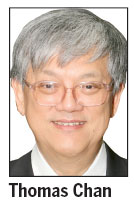'Ethnic politics' poison society
Updated: 2013-02-20 06:22
By Thomas Chan(HK Edition)
|
|||||||
The idea of Hong Kong "ethnic groups" has recently gained popular traction in local media and talk shows. The concept originated in the writings of individuals advocating more autonomy and even independence of Hong Kong (an already highly autonomous territory under the "One Country, Two Systems" regime enshrined in the Basic Law). A vocal proponent of this idea has even called upon the people of Hong Kong to set up their own nation apart from the Chinese mainland.
This has reminded us of the cultural strategy of the Democratic Progressive Party (DPP) in Taiwan. In the early 1990s, as electoral politics spread across the island, theorists of the DPP had put forth the argument that there were four major ethnic groups in Taiwan: the Hoklo and Hakka peoples, mostly from Fujian province, migrants from other mainland provinces and the island's native tribes. I believe the first three groups are not necessarily independent ethnic groups, as they all belong to the race of Han people, albeit with different linguistic cultures that represent dialectical variations rather than separate languages.
Hoklo, Hakka and other mainlanders have long co-habituated many other localities throughout China, not just in Fujian or Taiwan. Each of the supposed "ethnic groups" may entertain dissimilar social and cultural practices or customs, but the differences are not great enough to distinguish them as separate ethnic groups.
The classification by the DDP theorists is not intended for theoretical clarity; their purpose has been political. By putting the locals (in particular the older migrants to Taiwan from southern Fujian) against those from other provinces of China (the more recent migrants), they try to demonstrate the ethnic difference between the two. Their purpose is to justify the political agenda of "Taiwan independence", to support claims that the island is a separate nation-state from China based on the independent ethnic group of the older migrants. What started as a vague and mistaken notion of ethnicity has evolved into the cultural-cum-political strategy for "Taiwan independence". This is what the French sociologist Pierre Bourdieu calls a politics of assumption, which uses and popularizes "pseudo concepts" on the basis of erroneous or dubious assumptions so that political group(s) might shape and create a new political reality.

In Hong Kong, this new political reality that radicals would desire is certainly not "One Country, Two Systems", but a Hong Kong that breaks away from China. The fact that proponents of Hong Kong people as a separate ethnic group from mainland Han people were those waving the British colonial flag in recent public demonstrations would make us believe that they are in fact struggling for a new Hong Kong of the colonial past - old wine in an old bottle.
The excessive domination of the local economy by financial capital and real estate developers has already strangled the competition and spirit of entrepreneurship in the local economy. But cross-border purchasing power of the mainland's middle class has helped to provide HK$300 billion retail sales per year (at least half of the total local sales), while creating hundreds of thousands of jobs for local Hong Kong people. As a result, unemployment has ceased to be a social problem, and the territory has been able to enjoy slow but steady economic growth. However, this dynamic has not been able to create enough uplift for the local economy's development of growth industries. The middle class is still shrinking and the younger generation has gradually lost their hope of upward mobility, especially in the aftermath of the financial tsunami which has also shrunk the local financial sector. The massive financial reserves of the Hong Kong government and near full employment locally seem to be no guarantee for social harmony and political stability. Everybody seems to be convinced that Hong Kong society is being polarized, and the recent Legislative Council election results reinforced this belief for many.
If at this critical historical conjecture, there emerges a politically-charged pseudo concept of "ethnic groups", social polarization may nurture further political schism across the local society. In the past, political activism in Hong Kong before 1997 had been anti-colonialism and nationalistic in nature. After the handover, it has changed to the "civil society" against the government. The pseudo concept of ethnic groups is threatening to create social schism that would lead to the transformation of the current political schism. The proponents of more autonomy or independence are revolutionary in orientation and nature, even though they have publicly denied it, or, they aren't aware of their own nature. Their only means of social and political protest seems to be mass demonstration, rather than lobbying in the legislature or to the government. Growing violence on the streets (as witnessed in recent demonstrations) is not and should not be tolerated, as it would not lead to any constructive compromise politically.
The government and society of Hong Kong should be aware of the potential destructive effect of the politics of "ethnic groups", and should not offer the concept political space to expand and grow.
The author is head of China Business Centre, Hong Kong Polytechnic University.
(HK Edition 02/20/2013 page1)